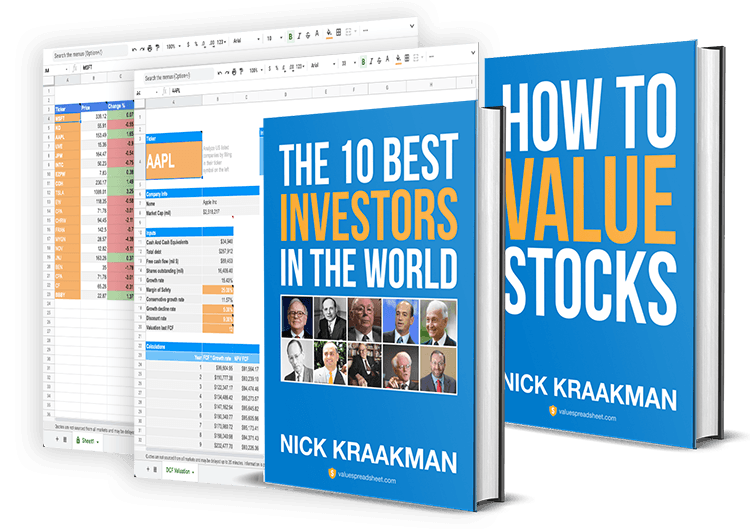
The stock you bought only a couple of months ago with high hopes suddenly plunges on some bad news, like lower-than-expected earnings. We have all been there. It's not fun, but it is part of the game. Ben, one of my readers, asked me how to deal with such gnarly situations, and that is exactly what this article is all about.
Contemporary economic theories assume that all economic actors act rationally. However, the field of Behavioral Finance has proven that market prices are in fact set by groups of people who let emotions like fear and greed dictate their investment decisions. This emotional rollercoaster is the perfect breeding ground for irrational behavior, and this emotion-guided irrational behavior makes stock prices move in unpredictable, and often extreme ways.
The fact that stock price movements are often irrational, and therefore say little about the actual performance of the underlying company, is a very important concept to grasp if we want to deal with bad news in an objective way. Let's say you have spent hours analyzing a company and have decided that it is a great investment at the current price. You start buying, but two months later the stock price drops by 20%. How do you react? If you are like most people, you are probably already halfway towards the exit.
Is this the best way to react to a price decline? Well, sometimes taking a loss might be the best course of action, when for example the company starts experiencing serious long-term fundamental problems. However, there can be many reasons for the price decline which would call for the exact opposite action: buying more of a great company at an even lower price! In other cases the best action is to not take any action at all. Therefore the key is to keep the initial emotional reaction of fear from interfering with your rational judgment and to figure out what is actually going on.
In the case of a sharp price decline, follow the advice from the great Stoic philosopher Epictetus:
"Don't let the force of an impression when it first hits you knock you off your feet; just say to it: Hold on a moment; let me see who you are and what you represent. Let me put you to the test."
Epictetus
Sometimes you buy…
Indeed, put the company to the test. I'll give you an example from my own experience. I've talked about a company called The Female Health Corp. (FHCO) before in my Monthly Money Reports. I got in when it dropped from $10 to $8 a share, calculating that the intrinsic value should be somewhere around $12. Then they reported rather low earnings, which pushed the price down to $6. A 25% drop. Ouch..
Did I sell? No, I bought more. Why? Because the nature of FHCO's business model means they have significant fluctuations in quarterly earnings. So people were overreacting to a "decline in earnings", while the company's order book was in fact fuller than ever. This offered me a great opportunity to buy more of this high-potential company at an even better price.
This month their price declined to just below $4 a share after the company announced that from now on they would no longer pay a dividend. I bought more, because the price decline was again--at least in my humble opinion--a massive, irrational overreaction. First, dividend investors sold the stock en masse, creating significant downward price pressure. This has nothing to do with the company performing badly, but for this particular type of investors the company simply isn't interesting anymore.
Secondly, FHCO plan to reinvest these extra retained earnings into marketing their existing product, buying back shares, and developing new income streams. The key question to ask is of course if this will actually result in additional value for shareholders. Only time will tell, but the intentions of management are good, and based on their Return on Equity of more than 30%, this change of course has the potential to significantly boost future earnings. However, investors dislike uncertainty. They want high earnings and high dividends now. The next couple of years will teach me if I was right or if I overestimated FHCO's management.
As you can see from the previous example, you should try to distance yourself from your emotions and look at the situation objectively. Of course I feel a certain amount of fear when my initial investment of $8 a share is now trading 50% lower, but often these scary situations are opportunities in disguise. So keep your head cool and do not let fear distract you.
"Fear is wetting your pants. Courage is operating with wet pants."
Richard Branson
…sometimes you sell
So should you always buy more when the stock price drops? Absolutely not! I once owned Apollo Group (APOL). At the time, the company showed high profitability and was attractively priced. However, prices started declining and kept declining. The reason was that the United States government was not too happy about the way APOL ran its business and decided to investigate and put in place some legislation which seriously hurt APOL's bottom line.
I got in at $56 a share, expecting the business to be worth around $90. After 3 years I finally cut my losses and had to sell at $21 a share, meaning more than a 60% loss.. and you should add some major opportunity costs to that figure as well. I was paralyzed by fear for three full years. I just couldn't believe how this amazingly profitable company had suddenly turned into a classic value trap. Looking back, I should have realized sooner that the decline in profit was not a temporary thing, but was a sign of serious fundamental problems. In such cases it is warranted to cut your losses and run for the exit. This really hurt, but as Benjamin Franklin said:
"The things which hurt, instruct"
Benjamin Franklin
Conclusion
I hope these anecdotes can offer you some guidance on how to react when you see your stocks drop in price. Always take a step back and analyze the situation objectively. Is it a temporary, fixable setback? Then by all means, make use of this unique opportunity to buy more of a great company at an even better price. Is the company experiencing fundamental, long-term problems? Then get out of there. Learn and move on. In other cases, sitting still is often the best course of action. I would like to end with a quote from the great Andrew Carnegie:
"It is the decision made in the crisis which proves the man."
Andrew Carnegie
Good luck!



